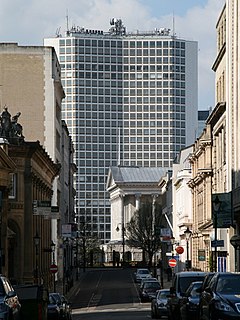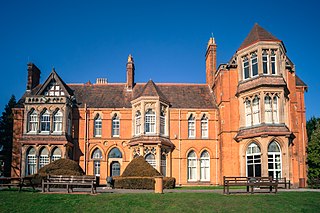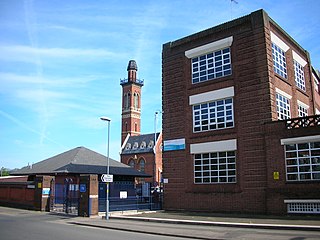
Birmingham Conservation Trust is a charity which saves and restores historic buildings in the city of Birmingham, England.

Birmingham Conservation Trust is a charity which saves and restores historic buildings in the city of Birmingham, England.
Birmingham Conservation Trust was founded in 1977 by Birmingham City Council as a vehicle to preserve and restore the city's built heritage. The Trust's first ever project was the Georgian Brewmaster's House which was completed in 1984.
The Trust continued to be affiliated to Birmingham City Council until a "Transition Grant" from the Heritage Lottery Fund in 2014/2015 made it possible for the Trust to become independent of the council. However, the Trust retains a good relationship with the council and over the last few years has seen it working on the Prefabulous project which focused on the council owned grade II listed prefabs on the Wake Green Road in the city.
In 2004 the Trust completed the conservation and restoration of the last surviving court of Back to Back houses on Hurst Street in the city. These are now run as a visitor attraction by the National Trust.

The Trust moved on to a short term project managing the protection of Perrott's Folly – a tower in the city which has close associations with J. R. R. Tolkien. Structural work was undertaken to ensure the stability of the tower which is now owned and managed by the ReFuture Collective.
The Trust has also been instrumental in the formation [2] of other charitable trusts set up to oversee single projects within the city. These include Highbury Hall, which is now maintained by the Chamberlain Highbury Trust and the Moseley Road Baths [3] which are now run by the Moseley Road Baths CIO.
The Trust's flagship project is Newman Brothers' Coffin Works: [4] [5] a grade II* listed Victorian factory situated in the Jewellery Quarter. Now run as a museum, the factory and its contents tells the story of Newman Brothers, Birmingham's last coffin-furniture firm, who operated from their Fleet Street premises for over 100 years until 1998 when workers laid down their equipment, and walked out of the building for the very last time, leaving everything, including personal belongings behind. The firm made some of the world's finest coffin furniture, including the fittings for the funerals of Winston Churchill, Joseph Chamberlain, Queen Elizabeth the Queen Mother and Diana, Princess of Wales.
Sections of the factory now comprise workshops and commercial units which house local businesses as well as the heritage hub which sees the Trust sharing offices with the Heritage Trust Network and Civic Voice.
Birmingham Conservation Trust believes in working with local people to find imaginative and sustainable solutions that address local needs. By doing this the Trust aims to:
It also seeks to actively encourage access and promote enjoyment of the city's historic buildings by:
Balsall Heath is an inner-city area of Birmingham, West Midlands, England. It has a diverse cultural mix of people and is the location of the Balti Triangle.

Moseley is a suburb of south Birmingham, England, three miles south of the city centre. The area is a popular cosmopolitan residential location and leisure destination, with a number of bars and restaurants. The area also has a number of boutiques and other independent retailers.
Moseley and Kings Heath is a ward within the constituency of Hall Green, covering the greater part of the Moseley and Kings Heath areas of Birmingham, England.

Edgbaston is an affluent suburban area of central Birmingham, England, historically in Warwickshire, and curved around the southwest of the city centre.

Perrott's Folly, grid reference SP047862, also known as The Monument, or The Observatory, is a 29-metre (96-foot) tall tower, built in 1758. It is a Grade II* listed building in the Edgbaston area of Birmingham, United Kingdom.

Moseley Bog, formerly The Dell, is a Local Nature Reserve in the Moseley area of Birmingham, England.

Although Birmingham in England has existed as a settlement for over a thousand years, today's city is overwhelmingly a product of the 18th, 19th, and 20th centuries, with little surviving from its early history. As it has expanded, it has acquired a variety of architectural styles. Buildings of most modern architectural styles in the United Kingdom are located in Birmingham. In recent years, Birmingham was one of the first cities to exhibit the blobitecture style with the construction of the Selfridges store at the Bullring Shopping Centre.
Simon Inglis is an author, editor, architectural historian and lecturer. He specialises in the history, heritage and architecture of sport and recreation. Inglis is best known for his work on football history and stadiums, and as editor of the Played in Britain series for English Heritage.

The Jewellery Quarter is an area of central Birmingham, UK, in the north-western area of Birmingham City Centre, with a population of around 19,000 people in a 1.07-square-kilometre (264-acre) area.

Highbury Hall, now a Grade II* listed building, was commissioned as his Birmingham residence by Joseph Chamberlain in 1878, two years after he became member of parliament for Birmingham. It took its name from the Highbury area of London, where Chamberlain had lived as a child. The architect was John Henry Chamberlain, who incorporated much terracotta decoration.

Edgbaston Waterworks lies to the east of Edgbaston Reservoir, two miles west of the centre of Birmingham, England.

The Public Library and Baths on Moseley Road, Balsall Heath, form one of many pairings of baths and libraries in Birmingham, England.

Birmingham Civic Society is a voluntary body in Birmingham, England, and is registered with the Civic Trust.

The Birmingham Baths Committee was an organisation responsible for the provision and maintenance of public swimming and bathing facilities. Birmingham City Council funded, constructed and ran bathing facilities throughout the city. The movement to develop baths and wash houses in Britain had its impetus with the rapid urbanisation of the Industrial Revolution, which was felt acutely in Birmingham, one of England's powerhouses.

Newman Brothers at The Coffin Works is a museum in the Newman Brothers Coffin Furniture Factory building in the Jewellery Quarter conservation area in Birmingham, England. The museum educates visitors about the social and industrial history of the site, which operated from 1894–1998 as a coffin furniture factory. The museum opened in October 2014 after a fifteen-year campaign by the Birmingham Conservation Trust to save the factory building, which ceased trading in 1998, and raise the funds to transform it into a heritage attraction. Located at 13–15 Fleet Street, the building is Grade II* listed.
The National Trust and English Heritage are the best known building conservation trusts in the United Kingdom for the protection of listed buildings and buildings of architectural importance. The Churches Conservation Trust, which was initially known as the Redundant Churches Fund, is a UK charity whose purpose is to protect historic churches at risk, those that have been made redundant by the Church of England. The Landmark Trust is a British building conservation charity, founded in 1965 by Sir John and Lady Smith, that rescues buildings of historic interest or architectural merit and then makes them available for holiday rental. There are many buildings within the United Kingdom that are not under the care of any of the aforementioned trusts but are recognised for their importance by local conservation and preservation groups. These groups are listed below:

Brookvale Park is located in the Stockland Green Ward of Erdington Constituency in England. The park surrounds Brookvale Park Lake. Within the park there is a bowling green, tennis courts, a children's play area and sailing club. Many local residents and groups take an active interest in the park and the lake.

Kings Heath is a suburb of south Birmingham, England, four miles south of the city centre. Historically in Worcestershire, it is the next suburb south from Moseley on the A435, Alcester road.

Moor Pool is a 22.32 hectares garden suburb within the ward of Harborne, Birmingham, England. It was designated a Conservation Area in July 1970, which was raised by an Article 4(2) direction order in 2006. A Conservation Area Character Appraisal and Management Plan was adopted in March 2012.

Moseley Park is an 11-acre (4.5 ha) private park in Moseley, Birmingham, maintained by Moseley Trust. It is located to the west of the district centre and the A435 Alcester Road.